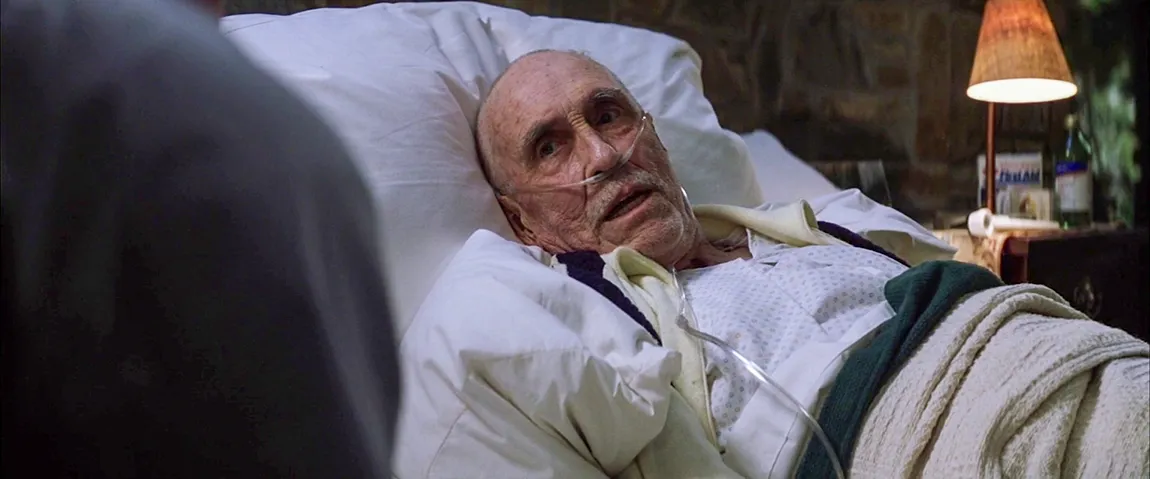Earl Partridge
“This is so boring.”
It’s barely 20 minutes into the movie. Earl Partridge bemoans his own existence, but he’s also speaking to the audience about the cliché of his plight: “You know, the dying wish, and all that, old man on a bed, wants one thing … .”
Newest Essays
“but it did happen”: The Importance of Four Words in the Corner
Kiss, Interrupted: “Say it, Jimmy”/“Just let me go, Jim”
The Unseen Ending: The Death of Jimmy Gator
An Active God, Acts of God: Dixon as an Agent of the Divine
The Kid in the Hall: An Introduction on a Prologue
Prisoner and Preacher: Earl Partridge
Why Are There Frogs Falling from the Sky?
But it’s boring for Earl, because he has no control over it, and he’s just an old man on a bed.
This is Anderson’s punishment for Earl, which he then intensifies by making him largely unresponsive in his interactions with Linda and especially (eventually) Frank. Earl cannot say goodbye to Linda, and he can’t object when she berates Phil for trying to contact Frank. When the prodigal son returns, Earl must simply absorb the verbal abuse, and he isn’t even allowed to validate his son’s feelings.
For obvious reasons, Earl doesn’t actually do anything in Magnolia besides talk, and what he says is often disjointed. He’s clearly morphine-addled, and he admits he has difficulty keeping things straight. This, too, is a punishment: He has things he wants to say, but he struggles: “This is the regret that you make. This is the regret that you make and the something you take, and the blah blah blah blah blah blah. Something something.”
Earl speaks those words in an eight-minute-plus unburdening to Phil in Magnolia’s final hour. Pointedly, it comes just after Frank defiantly tells his audience: “I will not apologize for who I am. I will not apologize for what I need. I will not apologize for what I want.”
Back in the Partridge house, Earl calls Phil to his bedside. “I’m … I’m gonna try … talk,” he says. “And I’m tryin’ to … to say something something.”
He haltingly tells Phil about his wife Lily — when he first saw her, how he cheated on her repeatedly over 23 years of marriage, how she got cancer when Frank was a teenager. “And I’m not there, and he’s forced to take care of her. He’s 14 years old, to take care of his mother and watch her die on him. A little kid. And I’m not there. And she does die.”
Earl is undoubtedly sincere in listing his sins, but he’s also making a deathbed confession to a paid companion who’s basically a stranger; the gesture is hollow. Lily’s dead, and even if the morphine didn’t prevent Earl from later apologizing to Frank, it would be too little, too late.
The old man trapped in a bed is left with only this: “I’m 65 years old, and I’m ashamed.”
Yet Anderson gives him a gift: a platform. After five minutes of Earl talking to Phil, Magnolia cuts to pouring rain, and a car pulling up to a house. For a moment, we think we might be done with Earl and Phil.
But Earl keeps talking, and he’s speaking forcefully to the movie’s other major characters.
Jimmy arrives home. “The god-damned regret,” Earl wails.
Claudia showers. Jim and other cops are looking for his gun. Stanley breaks into the library. Donnie makes preparations for his burglary. Linda drinks vodka and swallows some of Earl’s pills. Frank sits in his car. “What did I do?” Earl asks, over and over.
He’s still speaking to Phil, but the words are also directed at every other major character by accompanying their actions.
The message is twofold.
First, understand the difference between honest errors and the bad shit: “Mistakes like this you don’t make. Sometimes, you make some, and okay. Not okay sometimes you make other ones. Yeah. Know that you should do better.”
Second, transform regret into fuel for change instead of letting it fester: “You regret what you fuckin’ want. Use that. Use that. Use that regret for anything, any way you want.”
Earl waited too long to understand either of those things, but his admonitions become redemption because Anderson turns private shame into a public broadcast — to all his other characters, and to the audience.
Know that you should do better, and then use regret to actually do better. Don’t end up like the old man on a bed.

